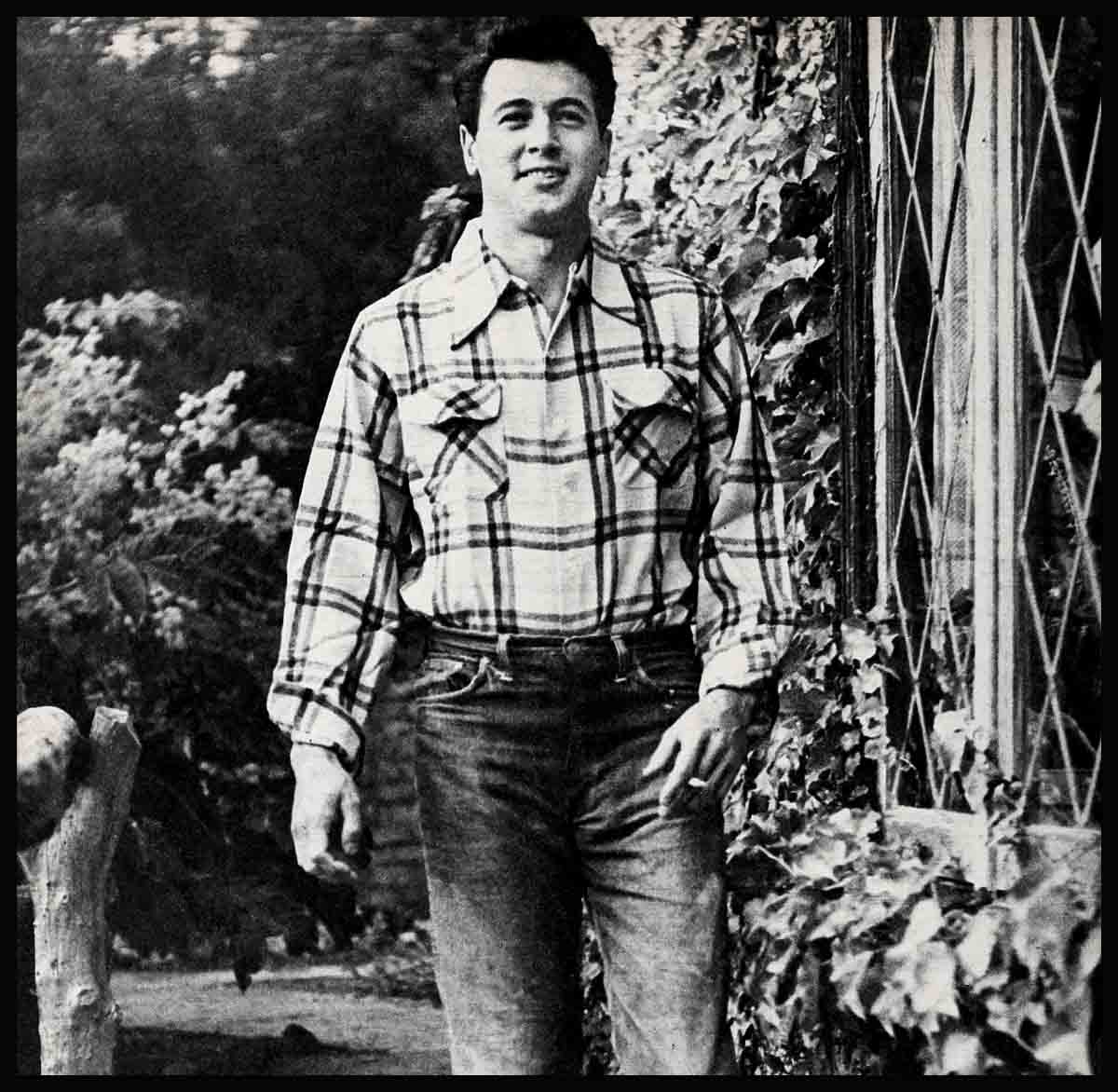
Bachelor Daze—Rock Hudson
At eight o’clock the alarm clock rang, two wonderful hours later than usual, but Rock Hudson opened his eyes reluctantly, then sat up in surprise. He was in a strange room in a strange bed. Then, smiling sheepishly, he stretched out again—all six foot four of him—until his bare feet stuck out from under the covers. He’d forgotten! Of course! He was in his new home. There was his jacket hanging over the new wardrobe unit he’d just bought yesterday and his slacks flung over the packing cases that had yet to be emptied.
Since he was a kid he’d looked forward to having a house of his own. It sure felt good.
Last night was the first he’d spent in his new palace. The gang had come over for an impromptu housewarming that lasted until after three and he didn’t get much work done. There wasn’t much that could be done though, he rationalized. The bed still belonged to the furniture company; it was only a loan until they finished making his eight-foot custom-built bunk. There were his phonograph player and records, and a few pieces of bric-a-brac he’d collected during the years, and his new wardrobe unit, but other than the few pieces of lawn furniture, the rooms were still empty.
“But as long as we have a roof of our own over us and music, Tucker,” Rock spoke earnestly to his dog, “we’ve no worries.” Flicking on the FM set, he tuned in on some music.
Usually, Rock shaves and bathes with the radio blaring. This morning he regulated to moderate and went to brew himself some coffee. No need for efficiency this morning, he had a late call to the set—a rare ten o’clock scheduling.

Double-checking his appointment calendar brought good news. He had only one shot today, which meant he’d have the afternoon free for furniture shopping. That is, after the interview set up by the publicity department for lunch. Interviews always give Rock a momentary depression; he still feels a little uneasy during them.
An hour later, Rock drove his yellow Lincoln convertible onto the back lot at Universal-International, snapped off the ignition and the radio, paused to jot down a few records he wanted to buy on the note pad on the dashboard. He made his way to his new dressing room, where fifteen minutes later, groaning under a fleece-lined mackintosh, heavy snow boots and woodsman’s cap, he exited into the bright, hot California sunshine.
The day was prematurely warm for spring, but the “All That Heaven Allows” company was scheduled to work in the “snow.” In camera range, Jane Wyman, in a long clipped beaver coat, boots mittens and hood, was picking her way down an “icy” street. Rock grinned sympathetically at her and presented himself to director Douglas Sirk.
“Be another half an hour before we need you,” he was told.
“Good,” grinned Rock, stripping off his heavy overclothes. “I’ll have a snooze.” And feeling lazy in the warm sun, he stretched out on the grass in the grateful shade of a spreading tree.
But no snooze.
Just when he was getting comfortable, an electrician came by to remind Rock of his promise to autograph a half-dozen portraits for his nieces and nephews back in Italy. Publicity had sent down the photos at Rock’s prodding. He borrowed a clip board from the script girl and a pen from a visiting newspaperman and obliged.
The company’s still photographer moved in next. He’d have a great shot, he begged if Rock would pose running the snow machine. The machine was used to turn the California summer-like grove into a wintry New England by spraying white soap bubbles—snow—movie version.
Climbing back into his winter garb, Rock sweated in the heat and glare of the white spray as he had his picture taken making snow—several pictures.
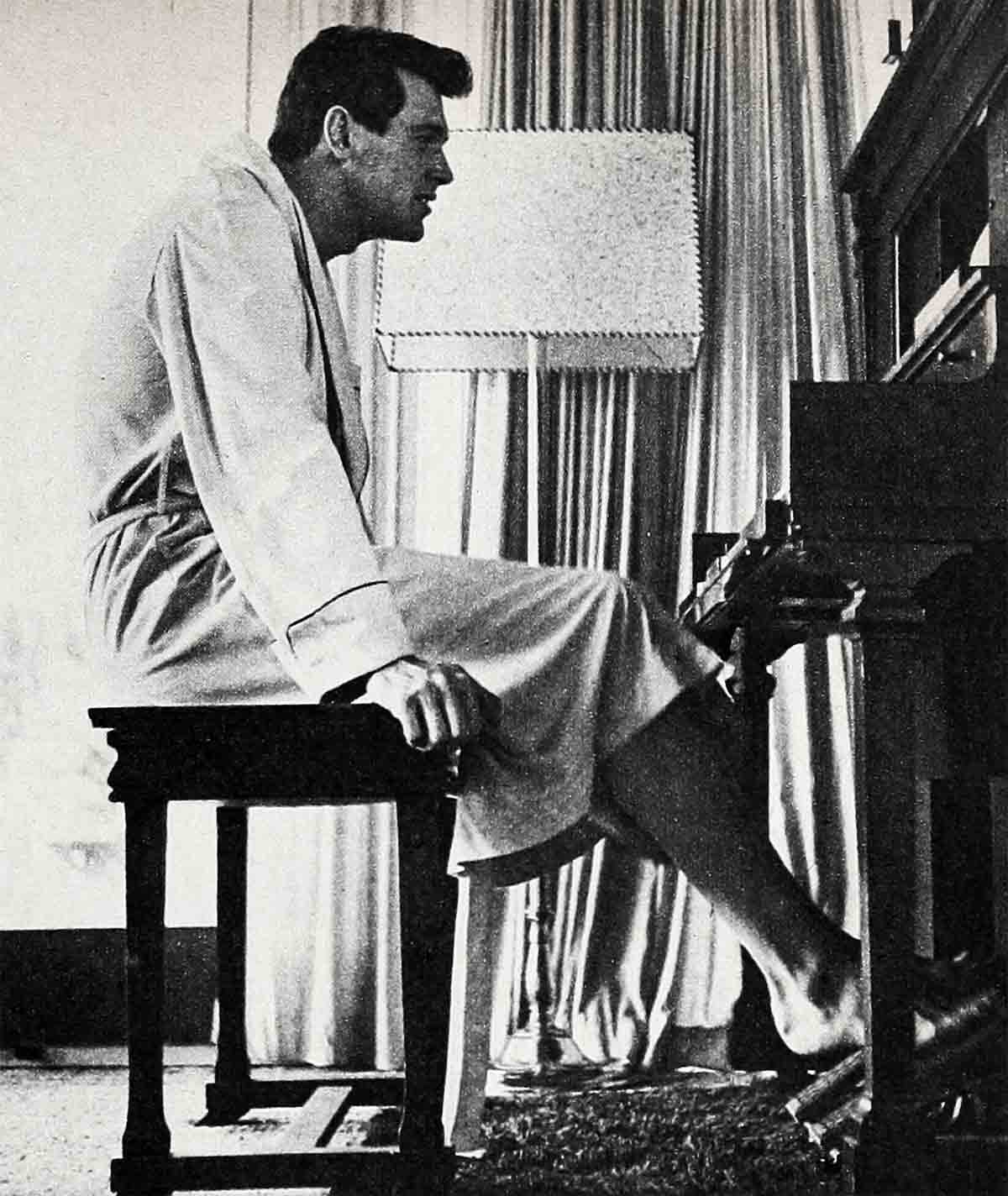
At last, shooting over, he stripped back to his shirt and slacks, stretched out again in the shade. A front-office limousine drove up and disgorged a party of studio visitors who had come from Australia. An intermediary made it clear to Rock they’d just love to have their pictures taken with U-I’s fastest rising, tall, dark and handsome star. Rock posed graciously. He smiled and shook hands. He autographed. He escaped finally—just in time to be tapped on the shoulder by the publicity representative with the lady interviewer in tow. It was twelve o’clock. He had toiled not, neither had he snoozed. That he didn’t snarl speaks eloquently for Rock Hudson’s native good humor and remarkably stable personality.
“Sit down,” he smiled, clambering to his feet again. “No, not on the ground. I’ll grab a chair.”
“Ground rules established?” he asked.
“Uh-huh.”
That meant that no questions were to be asked—at least not answered—about any present romantic interest in Rock’s life.
So he would talk about his new house.
“It’s a Pennsylvania Dutch farmhouse—barn red. Not very big, just thirteen hundred square feet—but lots of charm. And we have ideas. . . .”
“We?”
“Moved in yesterday,” Rock went on hurriedly. “No refrigerator. No stove. No chairs except a few garden things, so of course we had to have a party.
“Meant just to unpack. And then we opened up a carton of records, and decided we might as well have some music while we worked. And then it seemed a good idea to build a fire in the fireplace, and after that it seemed to be a good idea to have a snack—and suddenly it was 3:30 in the morning and we hadn’t unpacked a thing.”
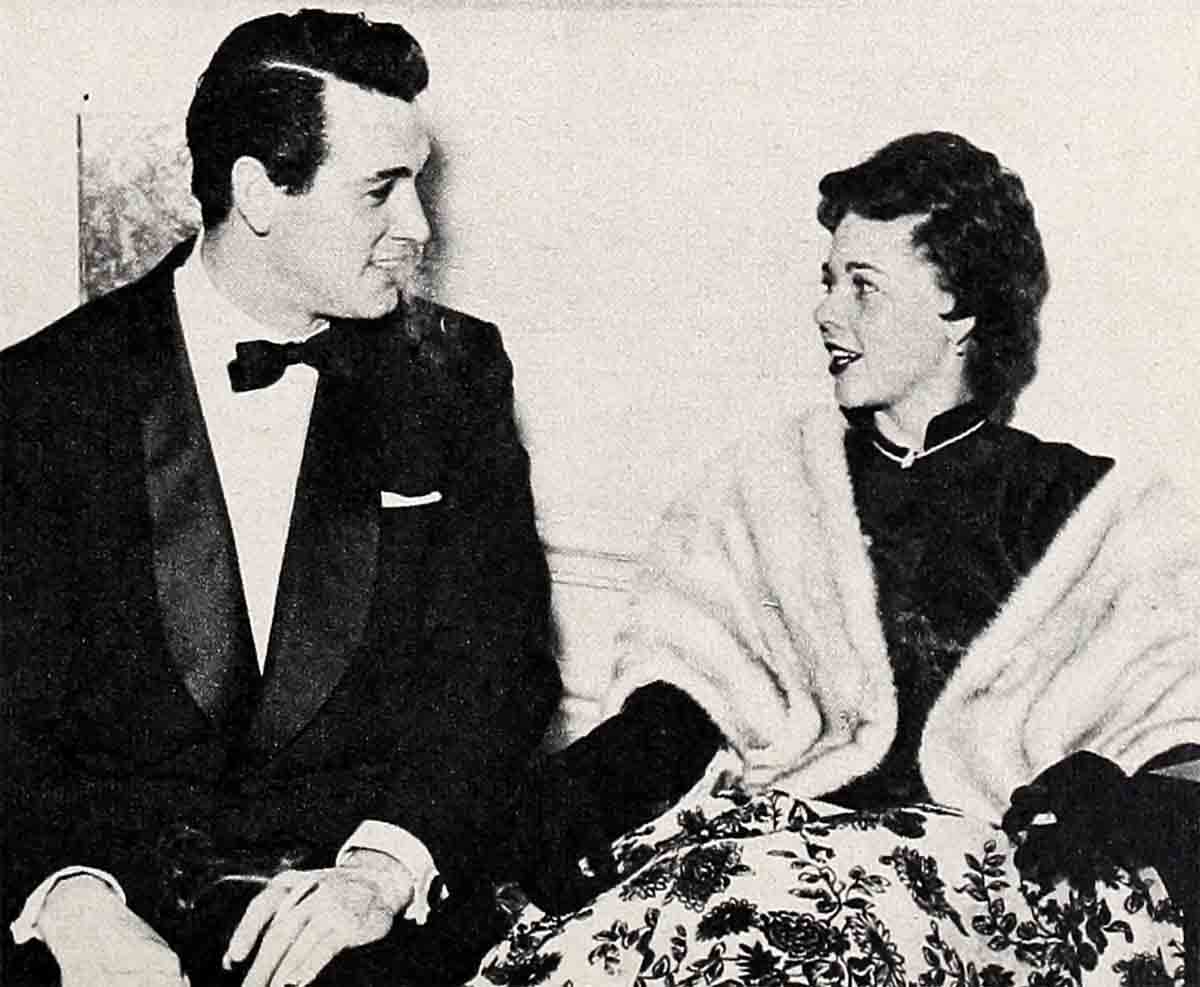
“Who’s we?”
“Off-side,” Rock said, gently but very firmly.
His clamming up on the subjects of ladies and love, of course, only made the subject more intriguing. Rock’s had girl friends before, and talked about them in print, and they’ve talked about him.
“Uh-huh,” he says, “you can talk a thing to death that way.”
But not this time, readers. If Hollywood’s most eligible bachelor is about to take unto himself a wife, you’ll know it when it appears in the vital statistics columns in the papers. If Rock has his way, that is.
Director Douglas Sirk called him for the shot at this point, and, grinning, Rock made a grateful getaway.
When the lunch whistle blew it was time for a hair-raising ride in Rock’s yellow convertible through the winding little streets which honeycomb the studio’s back lot to wind up unharmed—he’s a good driver, if a daredevil—in front of his dressing room.
If he had to have a fancy lunch with the ladies, he had to have a shower.
His “dressing room,” finished for him recently by a studio grateful for his tremendous upsurge with fans and ticket buyers, would do very nicely, thank you, as house and home. The spacious living room in modern decor is dominated by a monster sailfish hooked by Rock on one of his recent excursions to Acapulco. The rest of the set-up includes an office, kitchen, wardrobe room and bath.
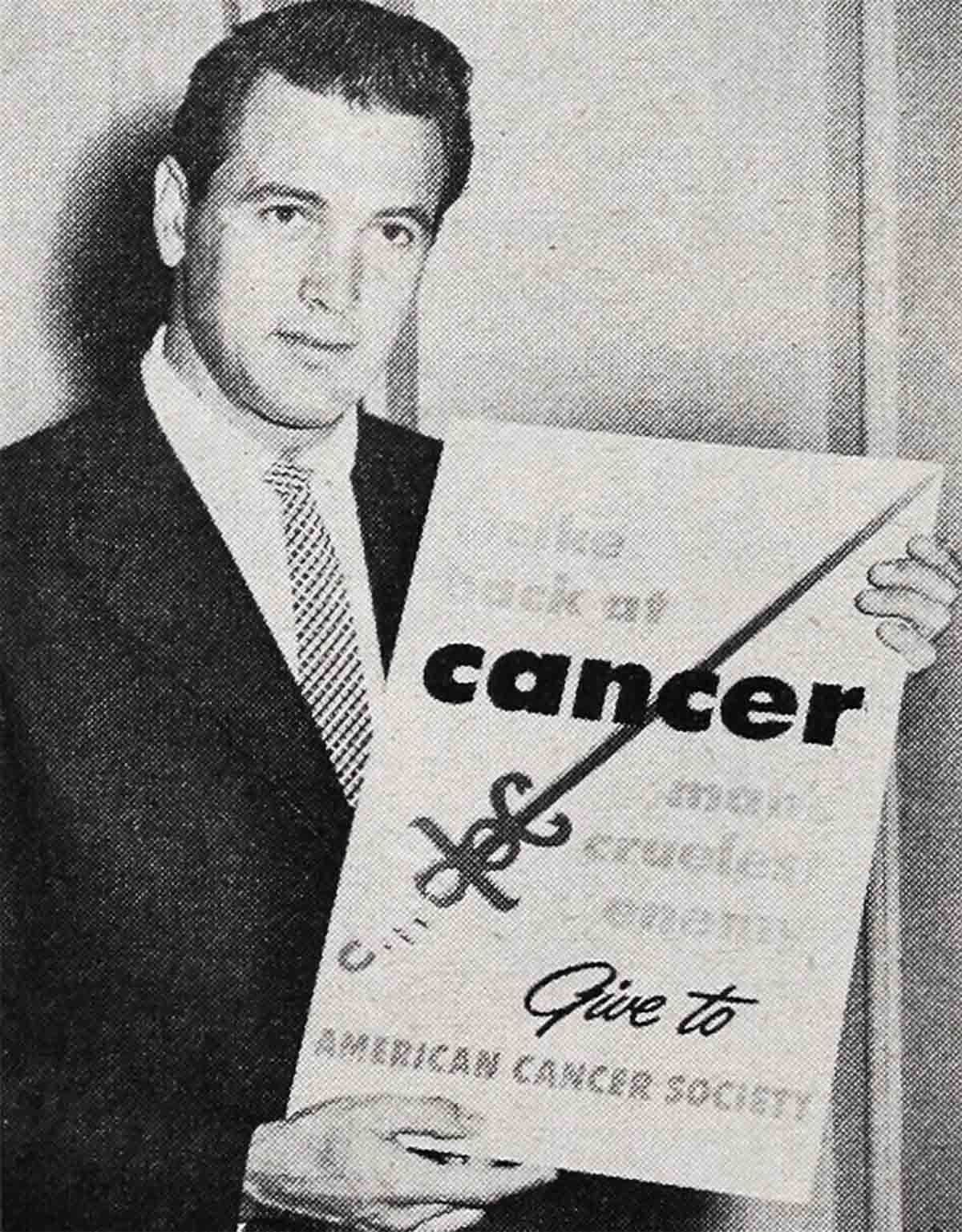
Rock’s first move was to the refrigerator where he extracted a bottle of chilled water and drained two giant glasses full.
“Man, it’s good” he sighed appreciatively. “There’s nothing like ice water.”
Unless it’s music. Five long steps took him back across the living room where he turned on his radio to an FM station. His guests could enjoy the music while he scrubbed up.
After a moment, he could be heard singing in the shower. This man, it seems, must have music wherever he goes. He collects every kind of music—with perhaps the least enthusiasm for jazz. His studio bungalow and his new house are overflowing with albums—classical, folk music and popular ballads.
He also collects, as it turned out, restaurants. We would lunch, he announced, emerging crisp and clean from the shower, at Le Petit Trianon, “a little French place, very authentic. The food is great, and they’ll take me like this.” This meaning in faded blue jeans, plaid cotton shirt and no tie.
Rock has been digging out little authentic restaurants as a hobby since he came home from his first trip to Europe—and first taste of exotic cooking—a year ago.
Rock’s girl friends—or friend, if the rumors are true—who used to pick up the phone to hear him say, “How would you like to run down to the record store with me and pick out a few new records,” are more likely today to have to keep in shape for an invitation to “try a little Italian restaurant I’ve discovered.”
Restaurant collectors will have to take Rock’s word on Le Petit Trianon. It was closed. But Scandia, up Sunset Boulevard a few blocks, would have Rock and his guests, and with no remarks, as it turned out, about his informal attire.
There’s nothing like ice water, or music or quaint restaurants to steam up Rock Hudson’s enthusiasm, it was next made clear—unless it’s food.
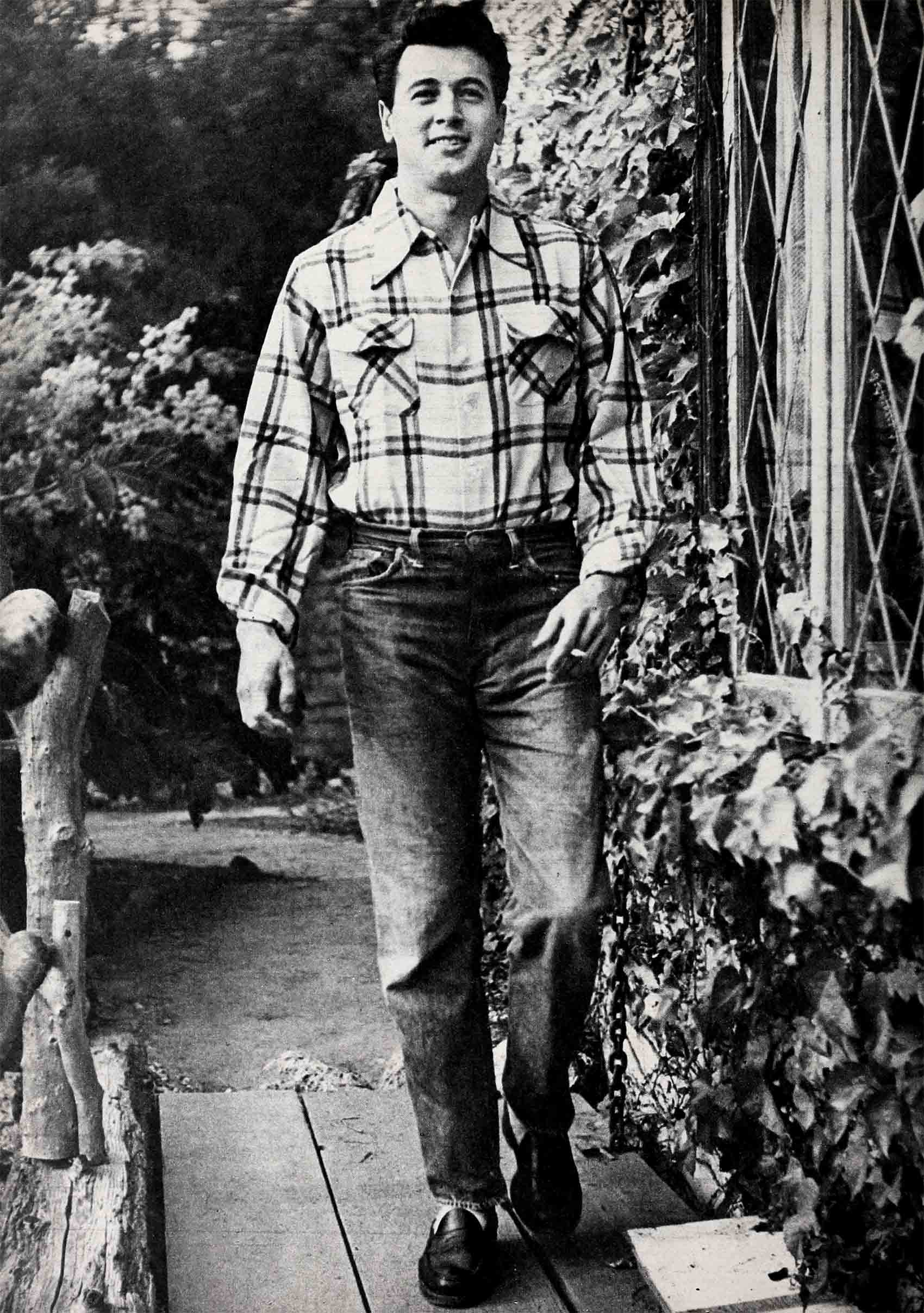
It was almost three o’clock in the afternoon by then and he was famished. First a heavy split pea soup—with Rye Crisp and three pats of butter.
“Butter is fattening, but the Rye Crisp are thinning. You come out even.”
Then a cheese souffle with a rasher of bacon, hot rolls with three more pats of butter, and—at last—coffee!
Rock felt better.
Lounging back comfortably in the upholstered booth, his long legs stretched comfortably out into the aisle, he looked directly at his inquisitor and asked a question of his own.
“How old are you?”
He got his answer, no ground rules having been established for such an emergency.
“Good,” he said. “Now I can relax. It’s a little test I always make. If I ask a lady her age and she says it’s none of my business, I know I have to be careful. If she tells the truth, then I know she’ll level with me all along the line. So what do you want to know?”
“Are you going to marry?”
“It’s getting stuffy in here,” Rock replied. “Want to see my new house?”
To reach Rock’s place, you drive up, practically straight up, from Sunset, make a half-dozen hairpin turns which, with Rock at the wheel, is an adventure, and there it is, a quaint red house perched on a precarious hillside and practically concealed by a grove of ancient spruce trees.
It’s a little house, but expandable. At present, it has only the big living room, kitchen, two small bedrooms and one bath, but it has room for a pool in front and a delightfully private redwood terrace off the larger bedroom. There is a horde of charming extras. Rock’s favorite is the built-in brick barbecue in the kitchen.
“I’m going to have a copper stove,” Rock declared. “And a fourteen-foot copper ice box. Fourteen feet! Hey, isn’t that an awful lot of ice box?”
Rock’s mother was there that afternoon, unpacking dishes and provender against the day when the kitchen would be practical, and came forth with photographs of the stove and ice box Rock had ordered. The “kitchen man” had just eft.
Definitely no decorator would work on his house. Rock made that clear. He would do his decorating himself.
“A house done by a professional decorator can be the prettiest house you ever saw and still, for my money, look like a department-store window.
“I want a few things that don’t fit. Then everybody’ll know it’s mine.”
At the moment, Rock leans toward the old English period. True, Early American would come closer to the vintage of the house itself, but Rock thinks, “Early American has had it. I don’t like to be conventional.”
He was going shopping later that day for a deep-piled, rust-colored carpet, the starting-off point for the living room. And he had an idea for a round dining table, which would expand with circular leaves. Maybe a friend of his, a furniture craftsman, “could work it out.”
“And I’ll have to have a desk. Gotta have a drawer to lose things in.”
And “I’d like a baby grand piano,” he said, almost wistfully, “if I could get it financed.”
He added immediately, knowing how strange such talk sounds coming from a top motion-picture star, “I’m working steady, but don’t get the idea I’m rich.”
The real-estate man had scoffed just a few days before when Rock told him his asking price for the house was more than Rock could afford. Mr. Hudson obviously had fallen in love with the place. Why should he haggle?
“If I had your money,” the realtor had said huffily.
“Huh,” snorted Rock, remembering, “he probably could buy and sell me.”
Still and all, for a guy who was driving a truck for a living six years and twenty-nine pictures ago, he is doing all right, and Rock, rich or not, would be the first to admit it.
It may be a while before he can have the baby grand, but he can always fall back on his old upright player piano with the five hundred rolls of music that go with it. An evening at Rock’s house is a party with that combination even when there’s no furniture and—as yet—no food.
“We’re going to make the garage into the pool house—after we get the pool.”
There’s that “we” again.
“My dog, Tucker,” Rock explains, smiling blandly, “and me, and the neighborhood cats.”
Okay, Rock, have it your way. But invite us to the wedding.
THE END
—BY PAULINE SWANSON TOWNSEND
It is a quote. PHOTOPLAY MAGAZINE MAY 1955




